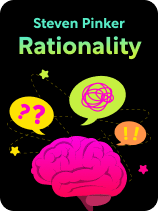

This article is an excerpt from the Shortform book guide to "Rationality" by Steven Pinker. Shortform has the world's best summaries and analyses of books you should be reading.
Like this article? Sign up for a free trial here.
How well do you know the basic rules of logic? How often do you break them? Can you tell when others use flawed thinking?
Steven Pinker argues that people often act irrationally even when they think they’re not. He examines how you can be more rational and make better decisions by improving your critical thinking skills and by understanding—and thus avoiding—the logical fallacies that people often fall victim to.
Continue reading for Pinker’s explanation of formal and informal fallacies.
Formal and Informal Fallacies
Pinker writes that one of the main reasons people think irrationally is that they use logic and critical thinking incorrectly. Critical thinking (also known as deductive reasoning) is the ability to accurately assess logic—to judge whether a conclusion is true based on its premises.
(Shortform note: In Blink, Malcolm Gladwell differentiates between two systems of thought that we use to arrive at decisions: conscious and unconscious. Our conscious minds think critically and weigh logical arguments, and our unconscious minds produce snap judgments that we sometimes can’t fully explain. While Pinker argues that deductive reasoning, which comes from our conscious mind, is the superior method of decision-making, Gladwell contends that our snap judgments can often produce better decisions because our subconscious brains are remarkably effective at sorting through and ignoring irrelevant information—details that can trip us up when we try to consider all possible premises logically when arriving at a conclusion.)
People often misinterpret logic and thus engage in fallacious arguments that lead to irrational conclusions. Pinker outlines two kinds of fallacies that people tend to succumb to: formal and informal fallacies. In formal fallacies, the conclusion is wrong. In informal fallacies, the premises are wrong. Let’s take a look at each kind in more detail.
Formal Fallacies
A formal fallacy is one where the conclusion doesn’t follow logically from the premise—thus violating the form (the structure) of a logical statement. This means the premises are valid and true, but the conclusion drawn from them doesn’t follow logically and therefore isn’t valid.
One common formal fallacy is called denying the antecedent (in other words, saying the first premise isn’t true, and then drawing a false conclusion):
- Premise: A equals B.
- Premise: Not A.
- Conclusion: Therefore, not B.
Here, the conclusion is fallacious because it might not always be the case. For example, you might say:
- If a creature is a fish, it can swim.
- A human creature is not a fish.
- Therefore, a human cannot swim.
In this case, both premises are valid, but the conclusion is false.
Another common formal fallacy is called affirming the consequent (or, saying the second premise is true and then drawing a false conclusion):
- Premise: A equals B.
- Premise: B.
- Conclusion: Therefore, A.
This might play out as:
- If a creature is a fish, it can swim.
- Humans can swim.
- Therefore, humans are fish.
This type of fallacy, affirming the consequent, is a common one people fall for because it implies a reciprocity that seems straightforward but is often not true: Just because A equals B, we can’t necessarily say B equals A. However, without deeper reflection, that conclusion sometimes does seem valid.
This fallacy can lead us to poor decisions. For example, “Groundbreaking, blockbuster products are always ones that are new to the market” does not mean “Products that are new to the market are always groundbreaking blockbusters.” But, if an entrepreneur convinces us her new product is guaranteed to be successful simply because no one’s ever seen it before (relying on this fallacy), we might lose money on a poor investment.
Informal Fallacies
Unlike formal fallacies, informal fallacies aren’t invalid. That is, the conclusion logically follows from its premises. However, the premises are faulty or irrelevant.
One example is the straw man fallacy, in which an argument is intentionally simplified, falsified, or otherwise misrepresented. For example, if a school principal says, “We must introduce more science into our curriculum,” someone using a straw man fallacy might retort, “So, you don’t care about the arts?” This conclusion relies on the premise that if a principal cares about math, she doesn’t care about the arts—a faulty premise.
Pinker writes that people create informal fallacies because they like to win arguments and they’ll take shortcuts to do so: Instead of building solid arguments based on true premises, they’ll make arguments that sound logical and will hope no one examines their premises too closely.
| Implicit Premises Drive Many Informal Fallacies Sometimes informal fallacies, such as the straw man fallacy outlined above, rely on implicit premises—unstated assumptions that the person making an argument expects the other person to accept as true without reflection. There are always some implicit premises in any argument because people don’t spell out every single commonly accepted truth of a situation—if you say a river isn’t poisoned because the fish aren’t dead, you’re implying, but not stating, that fish would be killed by poison. But, implicit premises can be incorrect. When an implicit premise is close to a commonly accepted truth, it becomes easy to pass it off as true, and in doing so, to make an informal fallacy. In the example above, the assumption that a principal who cares about math doesn’t care about art feels close to a possible truth because very often, a person who has an affinity for either math or the arts doesn’t have an affinity for the other. This makes it easy to pass off an illogical argument as logical. |

———End of Preview———
Like what you just read? Read the rest of the world's best book summary and analysis of Steven Pinker's "Rationality" at Shortform.
Here's what you'll find in our full Rationality summary:
- Why rationality and reason are essential for improving our world and society
- How you can be more rational and make better decisions
- How to avoid the logical fallacies people often fall victim to






